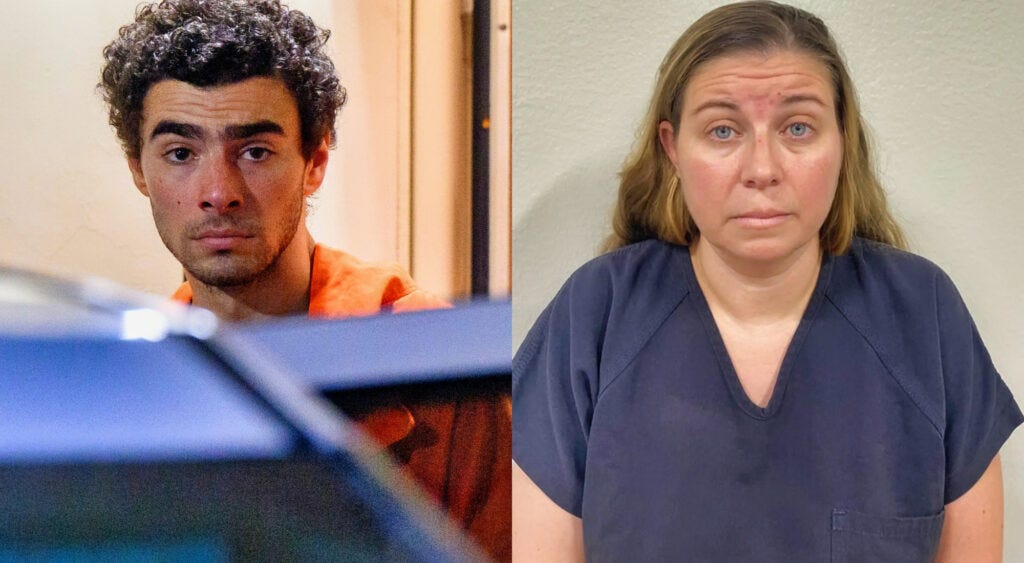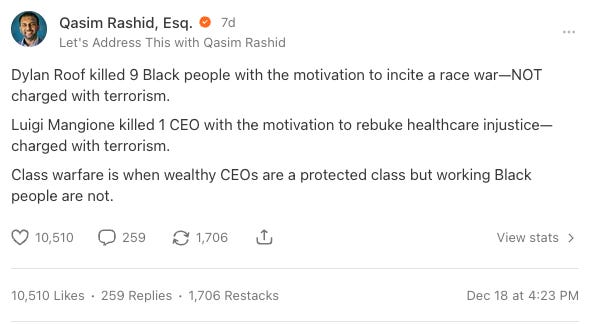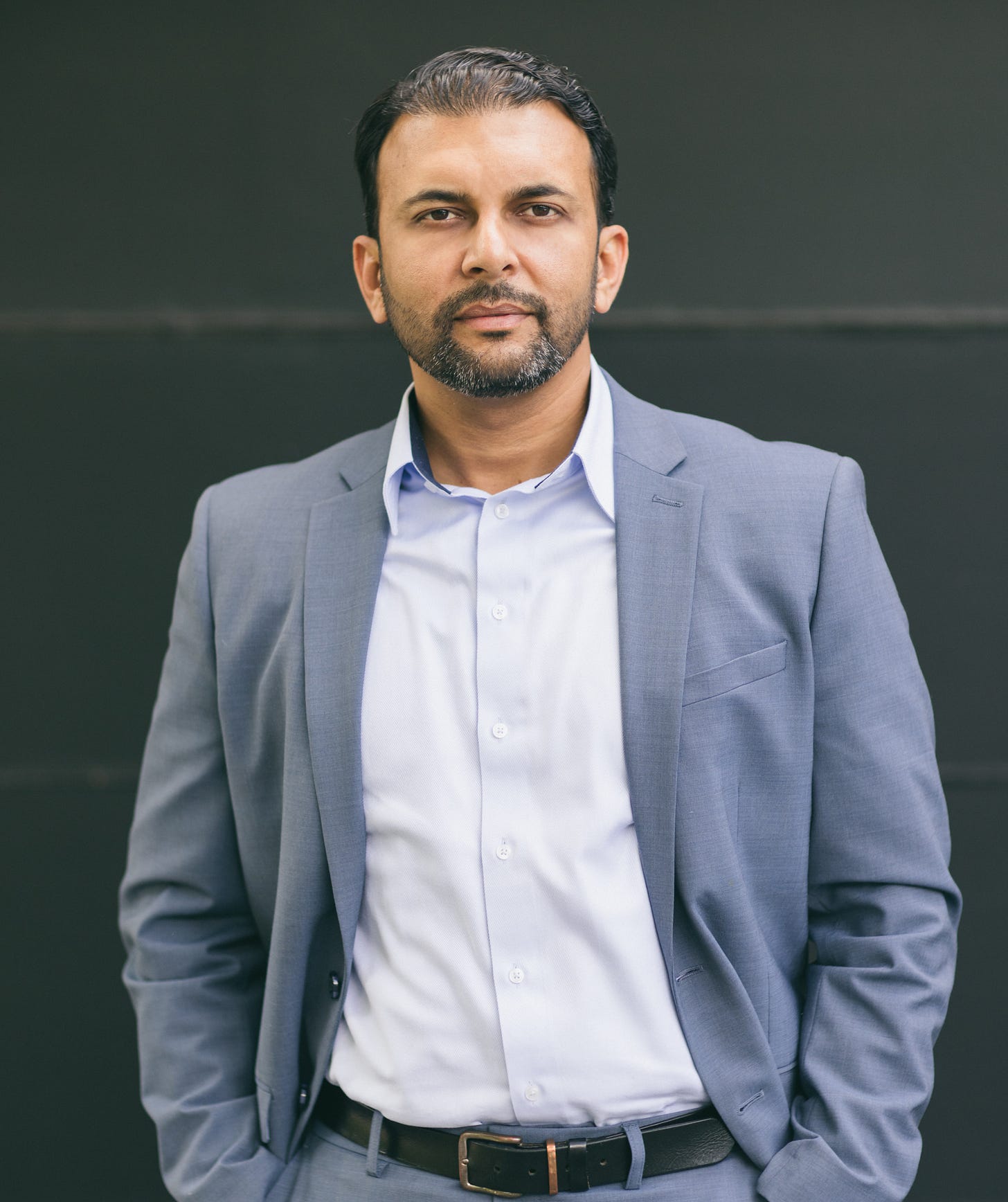
Judges, Terror Charges, & Health Insurance Corps
The hidden truth about the Judges overseeing cases against citizens charged for terrorism against health insurance corporations
Imagine you were sued by a neighbor, and the judge is your neighbor’s spouse? Or, imagine that you were sued by a corporation, and the judge holds financial interests in that corporation’s success. Do either of those situations seem fair?
Now imagine you are charged with terrorism, face 15 years to life in prison, possibly the death penalty, and the judge overseeing your case has familial or financial ties to incentivize your conviction. Unfortunately, none of what I am describing is hypothetical, but reflects the current reality of terrorism charges against American citizens. This is an ugly truth corporate media has largely ignored, but if our standard is justice and due process of law, we cannot afford to remain silent.
Let’s Address This.

Unprecedented Terrorism Charges
I posted the below comment across social media last week and it went viral on multiple platforms, I feel for good reason.
And Luigi Mangione is not alone. Since Mangione’s terrorism charge, another American citizen named Briana Boston has also been charged with terrorism. Mangione is in custody awaiting trial while Boston is under house arrest after posting $100,000 bond for the crime of stating “delay deny depose, you people are next.” I wrote about her case in detail here:
A 42-year-old Florida woman named Briana Boston has been arrested and charged on terrorism charges against Blue Cross and Blue Shield health insurance corporation. According to the arrest affidavit, after BCBS denied her health insurance claim, Boston responded, "Delay, deny, depose. You people are next." Apparently, though Boston does not own a firearm, has no violent criminal history, and indicated no acts of violence whatsoever—this statement amounts to a threat of terrorism and mass shooting.
Since these terrorism charges were filed, new information has come to light both about the genesis behind the charges as well as the judges overseeing the charges. This new information forces us to ask—are these citizens receiving due process of law, or have we unjustly ceded power to health insurance corporations?
Is This Due Process?
Recent reports indicate that, “Health insurance industry leaders leaned on the US Department of Justice to prosecute accused UnitedHealthcare CEO assassin Luigi Mangione.” Similarly, it appears that Blue Cross and Blue Shield contacted the FBI and local law enforcement and pushed for charges, ultimately ending up in terrorism charges against Briana Boston. If true, both are stunning examples of elite centibillion dollar corporations flexing their financial muscles to ignite terrorism charges against individuals. But the conflicts are even more direct when we consider the judges overseeing each respective case.
Judges have an ethical obligation to recuse themselves when a conflict of interest exists, even when only an appearance of a conflict exists. For example, The United States Courts Code of Conduct for Judges Canon 2 holds that, “A Judge Should Avoid Impropriety and the Appearance of Impropriety in all Activities.” It goes on to specify that this standard extends to the mere appearance of impropriety, explaining:
An appearance of impropriety occurs when reasonable minds, with knowledge of all the relevant circumstances disclosed by a reasonable inquiry, would conclude that the judge’s honesty, integrity, impartiality, temperament, or fitness to serve as a judge is impaired. A judge must avoid all impropriety and appearance of impropriety. This prohibition applies to both professional and personal conduct. Because it is not practicable to list all prohibited acts, the prohibition is necessarily cast in general terms that extend to conduct by judges that is harmful although not specifically mentioned in the Code.
Compare this explicit statement obliging judges to avoid even the appearance of impropriety with the ground reality of the judges overseeing Mangione’s case and Boston’s case, respectively.
Judge Katharine H. Parker
Judge Katharine H. Parker is currently overseeing Luigi Mangione’s case, as Mangione is charged with terrorism for killing a healthcare CEO. As journalist
astutely reported earlier this week:Magistrate Judge Katharine H. Parker, who is overseeing pre-trial hearings for Luigi Mangione, is married to a former Pfizer executive and holds hundreds of thousands of dollars in stock, including in healthcare companies and pharmaceutical companies, according to her 2023 financial disclosures. According to Parker’s [financial] disclosures, her husband Bret still collects a pension from his time at Pfizer in the form of a Senior Executive Retirement Plan, or SERP.
Judges have required financial disclosures for this very reason—to demonstrate they are not managing cases that could impact their financial well-being. This requirement exemplifies the sensitivity to the mere appearance of impropriety. Asking whether Judge Parker is capable of fairly overseeing Mangione’s case is the wrong question. The question worth asking is, does it give the appearance of impropriety that a judge heavily financially invested in the health insurance industry is overseeing a case about terrorism against the health insurance industry? Absolutely. But as Klippenstein also writes in his reporting, “The judge’s ties to the healthcare business are a stark reminder of how pervasive the for-profit industry is in American life.” Unfortunately, we see a similar case of concerning conflicts with Judge Catherine Combee, who is overseeing Briana Boston’s case and terrorism charge.
Judge Catherine Combee
Judge Catherine Combee is overseeing the terrorism charges against 42-year-old married mother of three Briana Boston. Notably, Boston does not own a firearm, never specified any form of violence, and has no criminal record whatsoever. Still, Judge Combee is proceeding on charges of terrorism against her for her remarks against BlueCrossBlueShield insurance corporation. And as with Mangione, herein lies the appearance of impropriety against Judge Combee. According to her alma mater, Polk State College,
Combee entered the healthcare field, working her way up through the corporate offices of Laboratory Corporation of America, overseeing quality assurance and scientific affairs, eventually becoming an associate vice president of the S&P 500 company.
Laboratory Corporation of America and BlueCrossBlueShield have extensive financial ties and partnerships that span tens of thousands of cases on a regular basis. And now a former executive for Laboratory Corporation of America is overseeing a terrorism charge against an American citizen, a charge pushed for by executives at BlueCrossBlueShield. Again, asking whether Judge Combee is capable of fairly overseeing Boston’s case is the wrong question. The question again worth asking is, per the US Courts Judicial Code of Conduct, is, does it give the appearance of impropriety that a judge heavily tied to the health insurance industry is overseeing a case about terrorism against the health insurance industry? Again, the answer is, absolutely.
This is where the US Courts Judges Code of Conduct is so critical, because it states in clear terms that the standard is not necessarily even a direct conflict, but that, “A judge must avoid all impropriety and appearance of impropriety.” It seems obvious both cases pursuing terrorism charges are currently failing to meet this critical standard of due process.
Conclusion
Let me be explicitly clear. I cite these examples not to intimidate or criticize these judges. I cite these examples to demonstrate the clear appearance of a conflict of interest between these judges, the cases they are overseeing, and the constitutional and sacred requirement of due process of law afforded to every person accused of a crime. As I wrote the day the UnitedHealth CEO was killed:
No, I don't think violently killing CEOs is the answer. I do think it's outrageous and disgusting that 70,000 Americans die preventable deaths annually because health insurance mega corps prioritize profits over healthcare and we don't acknowledge that as violent. Thanks for coming to my TedTalk.
Pay close attention to how these, and perhaps future similar cases, unfold, and whether the courts protect due process of law. To have judges with deep financial, practical, and personal ties to private health insurance corporations now oversee unprecedented cases against Americans accused of terrorism against those same private health insurance corporations exemplifies the massive appearance of impropriety that judges must rise above. However one feels about Luigi Mangione or Briana Boston, due process of law is not mere lip service. It is a constitutionally protected right that we cannot sacrifice for any reason. That is what equal justice under the law mandates of us, and that is what we must demand at every opportunity.


















Calling Luigi and Brianna terrorists while the US government is committing a fucking genocide is the height of hypocrisy.
Conflicts of interest on the part of judges selected to try cases that arise from class warfare are not an aberration. They are an essential feature of the system. It is too critical for our government and corporate ”leaders” to quash any potential uprising of the peasants by not allowing these cases to be tried by judges who are not reminded of where their loyalties need to lie.